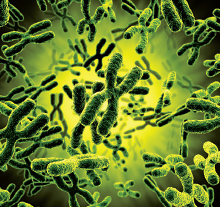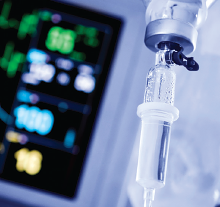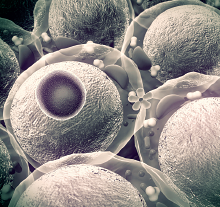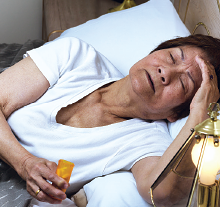Journal Digest
New Variant for Lithium Response Uncovered by Genome Study

An international research effort has identified a set of four linked genetic variants that are associated with an improved response to lithium in bipolar patients.
The 22 participating sites of the International Consortium on Lithium Genetics gathered data from over 2,500 patients with bipolar disorder and uncovered the potential response variants in a stretch of chromosome 21. The region identified contains two genes for long, noncoding RNAs (lncRNAs).
In an attempt to validate the initial findings, the team prospectively assessed a cohort of 73 patients who were being treated with lithium monotherapy and found that the patients with these four identified alleles had a 3.8-fold lower rate of relapse.
There is growing recognition of the role that lncRNAs play in regulating gene expression, especially in the nervous system. The authors noted that further work is needed to tease out the biological connections between lithium response and the lncRNAs.
This study was published in Lancet.
Hou L, Heilbronner U, Degenhardt F, et al. Genetic Variants Associated With Response to Lithium Treatment in Bipolar Disorder: A Genome-Wide Association Study. Lancet. Jan 21, 2016. [Epub ahead of print]
1 in 10 ICU Survivors Expected To Experience PTSD

About 10 percent of patients treated in an intensive care unit (ICU) are at an increased risk of posttraumatic stress disorder (PTSD), according to a study published in the American Journal of Respiratory and Critical Care Medicine.
“Although lower than prior research and public perception suggests, the rate of ICU-related PTSD is very comparable to the rates seen in current and former service members deployed to the recent Iraq and Afghanistan conflicts,” said lead study author Mayur Patel, M.D., in a press release.
Patel, an assistant professor of surgery and neurosurgery at Vanderbilt University, and his colleagues used the PTSD Checklist from DSM-IV to assess 255 ICU survivors at four hospitals (three VA hospitals and one civilian) at three and/or 12 months post discharge.
The researchers found that the cumulative incidence of ICU-related PTSD over 12 months was 6 percent based on PTSD Checklist-Event Specific Version scores (PCL-S) or 12 percent based on DSM-IV PTSD criteria. A history of PTSD or depression was a strong risk factor for developing ICU-related PTSD, while veteran status, delirium, or the amount of pain or sedative medication did not increase risk, Patel and colleagues reported.
Patel M, Jackson J, Morandi A, et al. Incidence and Risk Factors for ICU-related Posttraumatic Stress Disorder In Veterans and Civilians. Am J Respir Crit Care Med. Jan 6, 2016. [Epub ahead of print]
Disrupted DISC1 May Explain Relationship Between Psychiatric Disorders, Diabetes

A report appearing in the FASEB Journal has found that DISC1—a gene believed to increase the risk of developing psychiatric disorders including schizophrenia, major depression, and bipolar disorder—appears to influence the proliferation and activity of insulin-producing beta cells. The findings, according to the authors of the report, suggest DISC1 dysregulation may contribute to type 2 diabetes.
Researchers at the University of Massachusetts Medical School found that mice lacking the DISC1 gene in pancreatic cells, showed increased beta cell death, reduced insulin secretion, and greater glucose intolerance.
Additional biochemical analysis revealed that DISC1 operates by regulating the activity of another gene that makes an enzyme called glycogen synthase kinase-3β (GSK3β); when the researchers inhibited GSK3β in the DISC1-deficient mice, their metabolic profiles normalized.
“Our hope is that the association we’ve found linking disrupted DISC1 to both diabetes and psychiatric disorders may uncover mechanisms to improve therapies, even preventative ones, to alleviate suffering caused by both illnesses which are extraordinarily costly, very common, and often quite debilitating,” said study author Rita Bortell, Ph.D., in a press release.
Jurczyk A, Nowosielska A, Przewozniak N, et al. Beyond the Brain: Disrupted in Schizophrenia 1 Regulates Pancreatic β-cell Function via Glycogen Synthase Kinase-3β. FASEB J. Feb 2016; 30(2):983-93.
Mirtazapine Does Not Improve Sleep in Alzheimer’s Patients

The antidepressant mirtazapine does not appear to reduce insomnia in patients with Alzheimer’s disease (AD), according to a small double-blind study published in Psychogeriatrics.
Insomnia is a significant problem in people with Alzheimer’s that can aggravate cognitive problems and decrease quality of life. A previous study found that patients with AD and sleep disturbances who took 50 mg of trazodone daily slept more at night than those who did not take the medication.
In the current study, the participants received either 15 mg of mirtazapine (n=8) or placebo (n=16) at night for two weeks, and their sleep activity and cognitive status were assessed before and after the protocol.
Compared with the placebo group, mirtazapine users showed increased daytime drowsiness, but no improvement in the duration or efficiency of nighttime sleep following treatment. The cognition of both groups was also similar, as measured by the Mini-Mental State Examination.
There were no differences in any other adverse events between the two groups, but given the lack of efficacy and worsening daytime sleep patterns, the authors concluded that the study suggests “no significant therapeutic effect of 15 mg mirtazapine” in patients with AD.
Scoralick F, Louzada L, Quintas J, et al. Mirtazapine Does Not Improve Sleep Disorders in Alzheimer’s Disease: Results From a Double-Blind, Placebo-Controlled Pilot Study. Psychogeriatrics. Jan 27, 2016. [Epub ahead of print]
More Research Needed on Link Between Surgical Anesthesia, Cognitive Decline in Older Adults

A study of older adults who received anesthesia for surgery has found no association between anesthesia and the development of mild cognitive impairment (MCI) later in life, according to a report published in Mayo Clinic Proceedings. However, the study could not exclude the possibility that surgical anesthesia after age 60 might increase the risk of cognitive problems.
The Mayo Clinic research team enrolled 1,731 participants aged 70 to 89 and monitored them for several years while periodically assessing their cognition. After an average follow-up period of five years, 536 of the participants had developed MCI.
When examining the study participants’ surgical history prior to their enrollment, the researchers found that anesthesia exposure after age 40 (which occurred in 85 percent of the participants) was not associated with MCI, even when considering patients who had multiple exposures or long anesthesia durations. A secondary analysis revealed that anesthesia exposure after age 60 was associated with a 1.25-fold increased risk of MCI, though the data were borderline in statistical significance.
The study authors noted that additional studies are needed to determine the association between anesthesia exposure and MCI in the elderly.
Sprung J, Roberts R, Knopman D, et al. Association of Mild Cognitive Impairment With Exposure to General Anesthesia for Surgical and Nonsurgical Procedures: A Population-Based Study. Mayo Clin Proc. Feb 2016; 91(2):208-17.
Parental Depression Affects Children’s School Performance

Numerous studies have found that parental depression can have adverse effects on children. A report published in JAMA Psychiatry adds evidence that parental depression can have a profound negative impact on children’s academic performance.
Making use of Swedish registry data, researchers examined more than one million children born between 1984 and 1994, comparing grades at age 16 with parental depression status.
Diagnoses of parental depression at any point during a child’s life were associated with lower grades at age 16, averaging about 4.5 percentage points lower for maternal depression and 4.0 percentage points lower for paternal depression.
Maternal depression had a greater negative impact on school performance for girls compared with boys, especially if the depression occurred when the children were between the ages of 11 and 16.
“There are many notable sex differences in depression, but, rather than comparing maternal versus paternal depression, we should recognize that parental depression can have adverse consequences not just for the parents but also for their children,” coauthor Brian Lee, Ph.D., an associate professor at the Drexel University School of Public Health, said in a press release.
“Our study, as well as many others, supports that both maternal and paternal depression may independently and negatively influence child development,” he added. ■
Shen H, Magnusson C, Rai D, et al. Associations of Parental Depression With Child School Performance at Age 16 Years in Sweden. JAMA Psychiatry. Feb 3, 2016. [Epub ahead of print]



